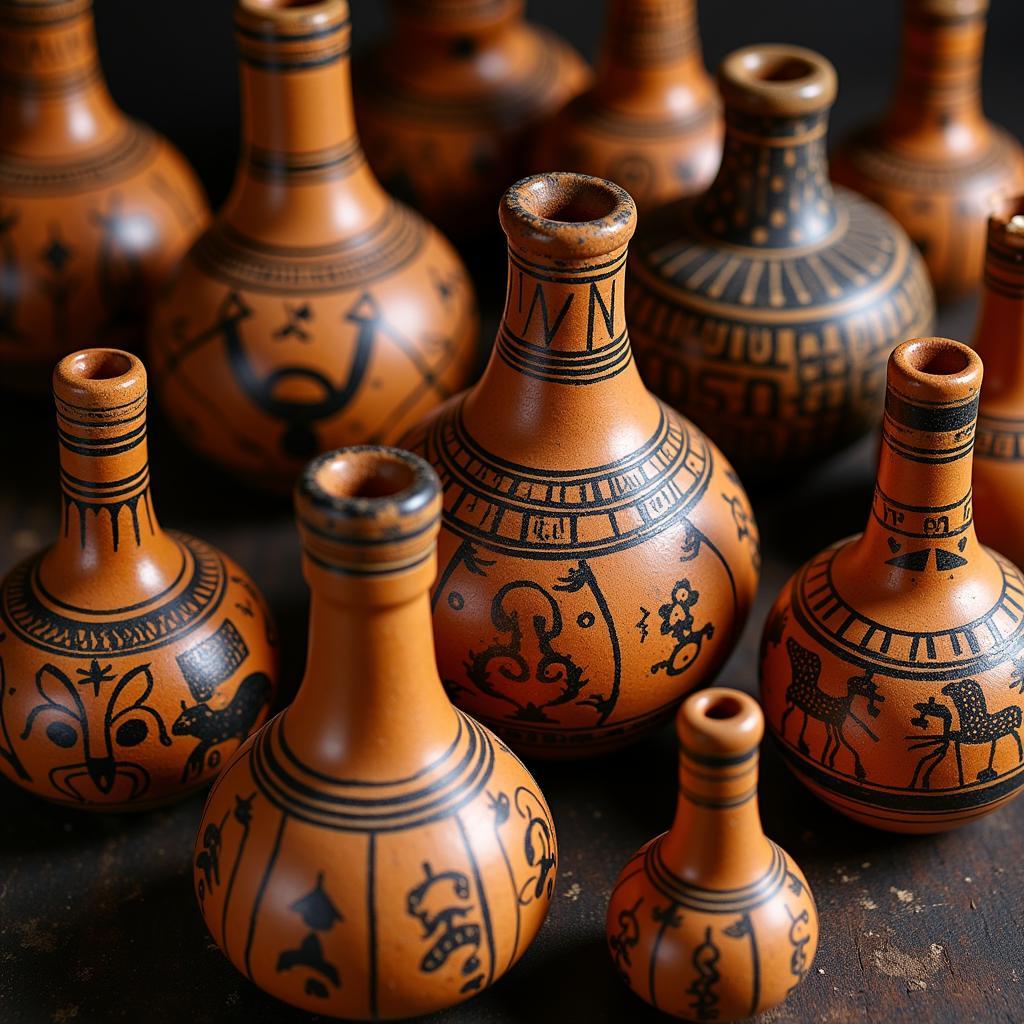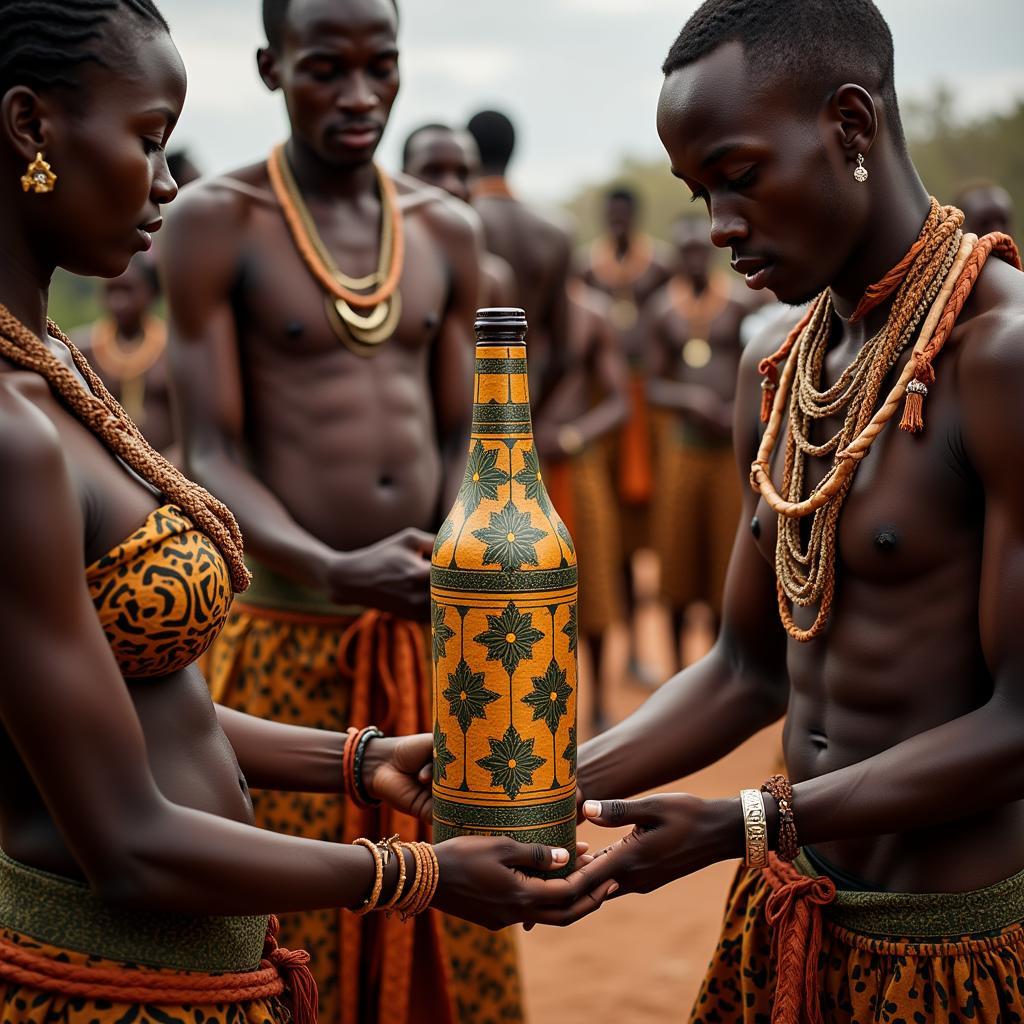The African Bottle: More Than Just a Container
The African Bottle, often crafted from gourds or other natural materials, holds a significant place in the continent’s diverse cultures. Beyond its practical use for carrying water and other liquids, the African bottle serves as a canvas for artistic expression, a symbol of cultural identity, and a testament to the resourcefulness of African communities.
The Many Forms of the African Bottle
Across the vast expanse of Africa, the appearance of the “African bottle” varies greatly, reflecting the unique traditions and resources of each region.
Gourd Bottles: Embracing Nature’s Bounty
One of the most common materials for traditional African bottles is the gourd. These versatile fruits, after being dried and hollowed out, transform into lightweight and durable containers. Their rounded shapes and natural curves lend themselves beautifully to intricate carvings and decorative embellishments. In West Africa, for example, elaborately decorated gourd bottles, often adorned with geometric patterns or symbolic imagery, are used in ceremonies and rituals.
 African Gourd Bottles
African Gourd Bottles
Clay Creations: From Earth to Artful Vessels
In regions where clay is abundant, skilled artisans mold and fire this malleable material into distinctive bottle forms. The resulting vessels, often adorned with vibrant glazes or earthy pigments, showcase the mastery of African pottery traditions. These clay bottles might be used for everyday storage or take on ceremonial roles, depending on the specific cultural context.
Beyond the Conventional: Exploring Diverse Materials
Beyond gourds and clay, African communities utilize a wide range of materials to create bottles, showcasing their ingenuity and adaptability. From woven fibers to wood to animal hides, the choice of material often reflects local resources and cultural aesthetics. For instance, in some nomadic communities, leather bottles, meticulously stitched and often adorned with beads or shells, provide a durable and portable solution for carrying liquids across long distances.
The African Bottle: A Symbol of Cultural Significance
Beyond their practical applications, African bottles hold deep cultural and symbolic meaning in many communities. They are often imbued with spiritual significance, representing prosperity, fertility, or ancestral connections.
Ritualistic Roles: Connecting to the Sacred
In some cultures, specific types of African bottles play integral roles in ceremonies and rituals. For instance, intricately decorated bottles might be used to hold libations offered to deities or ancestors. These vessels, imbued with sacred significance, act as a bridge between the physical and spiritual realms.
Markers of Identity: Reflecting Cultural Heritage
The unique designs and craftsmanship of African bottles often reflect specific cultural identities and traditions. The motifs carved onto gourd bottles, the patterns woven into fiber containers, or the shapes of clay vessels often carry symbolic meanings passed down through generations. These visual cues provide a tangible link to ancestral heritage and serve as a source of cultural pride.
Social Currency: Beyond Practical Value
In some communities, particularly in the past, African bottles held a form of social currency. A particularly well-crafted or elaborately decorated bottle might be considered a valuable possession, exchanged as a gift, or even used as a form of dowry.
 African Bottle Ceremony
African Bottle Ceremony
Modern Interpretations: The African Bottle in Contemporary Art
The enduring appeal of the African bottle transcends traditional uses. Today, contemporary artists across Africa and the diaspora draw inspiration from these traditional forms, reinterpreting them in innovative and thought-provoking ways.
A Source of Artistic Inspiration: From Canvas to Sculpture
Modern artists incorporate African bottles into their work, using them as canvases for paintings, transforming them into sculptural installations, or incorporating their forms and textures into mixed-media creations. These contemporary interpretations honor the rich history of African bottles while pushing creative boundaries.
A Global Platform: Sharing Cultural Heritage
The increasing recognition of African art on the global stage has also brought attention to the beauty and significance of the “African bottle.” These vessels, once primarily utilitarian objects, are now finding their way into museums, galleries, and private collections worldwide, sparking conversations about African artistry and cultural heritage.
The African Bottle: A Legacy of Resourcefulness and Creativity
The African bottle, in its myriad forms, embodies the ingenuity, resourcefulness, and artistic spirit of the continent’s diverse cultures. These vessels, far more than mere containers, serve as tangible reminders of the enduring power of human creativity to transform simple materials into objects of beauty, cultural significance, and lasting legacy.
FAQ: Uncorking Curiosity About African Bottles
What are African bottles typically used for?
African bottles serve a range of purposes, from carrying water and other liquids to storing grains and spices. They also play significant roles in ceremonies, rituals, and as expressions of cultural identity.
Where can I find authentic African bottles?
Authentic African bottles can be found at reputable art galleries, cultural centers, and online marketplaces specializing in African art and crafts. It’s crucial to ensure you’re purchasing from ethical sources that support fair trade practices and cultural preservation.
Are African bottles still made today?
Yes, African bottles are still crafted today, both for traditional uses and as contemporary art pieces. Many skilled artisans continue to pass down their knowledge and techniques through generations, ensuring the legacy of these unique vessels endures.
Delve Deeper into African Culture
Interested in exploring more facets of African culture? Discover the beauty of African animal craft activities or learn about the versatile uses of African black soap shampoo. For insights into interior design trends, explore the world of African gray, and if you’re planning a trip to Africa, our African countries capital and currency pdf will be a valuable resource. To delve into the fascinating world of the baobab, known as the African bottle tree, check out our dedicated article.
Connect with Us
For any inquiries or assistance, please reach out to our dedicated customer support team available 24/7. You can contact us via:
Phone: +255768904061
Email: kaka.mag@gmail.com
We are located at:
Mbarali DC Mawindi, Kangaga, Tanzania.

